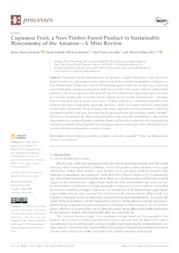Cupuassu fruit, a non-timber forest product in sustainable bioeconomy of the Amazon—A mini review.
Cupuassu fruit, a non-timber forest product in sustainable bioeconomy of the Amazon—A mini review.
Author(s): ROSA, J. S. da; MOREIRA, P. I. O.; CARVALHO, A. V.; FREITAS-SILVA, O.
Summary: This study examines the importance of cupuassu, a tropical fruit native to the Amazon, to Brazil’s biodiversity, the Amazon biome, and its potential for economic development. Cupuassu is a Non-Timber Forest Product and a fruit of the Theobroma genus, which also includes cocoa. Just in the state of Pará alone, cupuassu production in 2019 was over 4100 t with a gross value of 2.6 million USD produced. However, cupuassu cultivation still needs investment through technological advances to overcome threats such as witches’ broom disease and mycotoxin contamination. Cupuassu fruit is composed of pulp, seeds, and a shell; all these parts have a chemical composition with numerous bioactive compounds, especially the seeds, which also contain stimulant compounds, besides lipids and proteins. The processing of the whole cupuassu fruit has its economic value in the commercialization of the pulp, the extraction of cupuassu butter, and a product called Cupulate®. However, in this process, the cake resulting from the oil pressing, often considered a waste product, has potential as a source of proteins, peptides, lipids, and bioactive molecules with functional and nutritional properties. Recycling this fruit processing waste can create high-value-added products for various industries and promote a circular economy.
Publication year: 2024
Types of publication: Journal article
Unit: Embrapa Food Technology
Observation
Some of Embrapa's publications are published as ePub files. To read them, use or download one of the following free software options to your computer or mobile device. Android: Google Play Books; IOS: iBooks; Windows and Linux: Calibre.
Access other publications
Access the Agricultural Research Database (BDPA) to consult Embrapa's full library collection and records.
Visit Embrapa Bookstore to purchase books and other publications sold by Embrapa.

